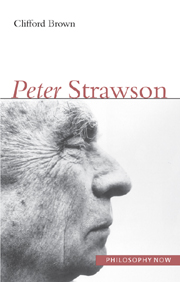Book contents
- Frontmatter
- Contents
- Abbreviations
- Introduction
- 1 “On Referring” and Introduction to Logical Theory: The basic questions
- 2 Individuals: An Essay in Descriptive Metaphysics: Towards a basic ontology
- 3 The Bounds of Sense: Kant's first Critique under analysis
- 4 Skepticism and Naturalism: Hume revisited
- 5 Analysis and Metaphysics: Summing up
- Notes
- Bibliography
- Index
5 - Analysis and Metaphysics: Summing up
- Frontmatter
- Contents
- Abbreviations
- Introduction
- 1 “On Referring” and Introduction to Logical Theory: The basic questions
- 2 Individuals: An Essay in Descriptive Metaphysics: Towards a basic ontology
- 3 The Bounds of Sense: Kant's first Critique under analysis
- 4 Skepticism and Naturalism: Hume revisited
- 5 Analysis and Metaphysics: Summing up
- Notes
- Bibliography
- Index
Summary
Beginning in 1968 and continuing until 1987, Strawson gave almost yearly at Oxford a series of introductory lectures in philosophy. In the course of those years, his account of the foundations of logical theory, his effort to provide a metaphysics that would be descriptive rather than revisionary, and his critical accounts of the philosophies of Hume and Kant were all in hand. We have seen how these works are closely and progressively related in their pursuit of certain common themes. Those lectures were gathered together and form the content of Analysis and Metaphysics, published towards the end of his career in philosophy. They are both introductory and comprehensive in two senses: (a) they do not presuppose any earlier familiarity with the subject; and (b) they are concerned for the most part with the general nature of philosophy rather than with a close analysis of particular problems. The book is introductory, but it is not elementary since, as Strawson puts it, there is no shallow end to the philosophical pool. It is comprehensive not in the sense that it is a summation in detail of his points of view, but in the sense that it shows the ways in which Strawson, in common with other writers in the analytic tradition, attempts to practise philosophy in its approach to resolving certain major issues arising in the connected fields of metaphysics, epistemology and the philosophy of language.
- Type
- Chapter
- Information
- Peter Strawson , pp. 167 - 198Publisher: Acumen PublishingPrint publication year: 2006



